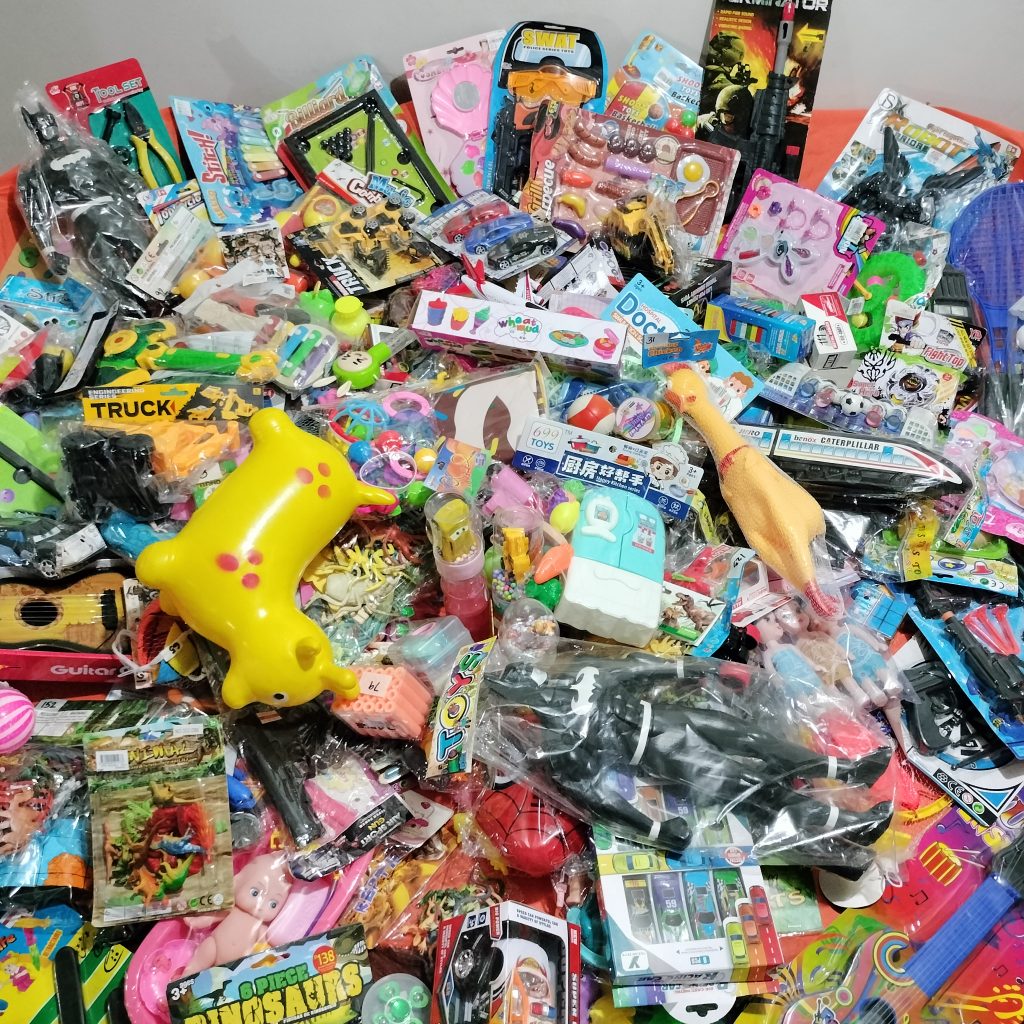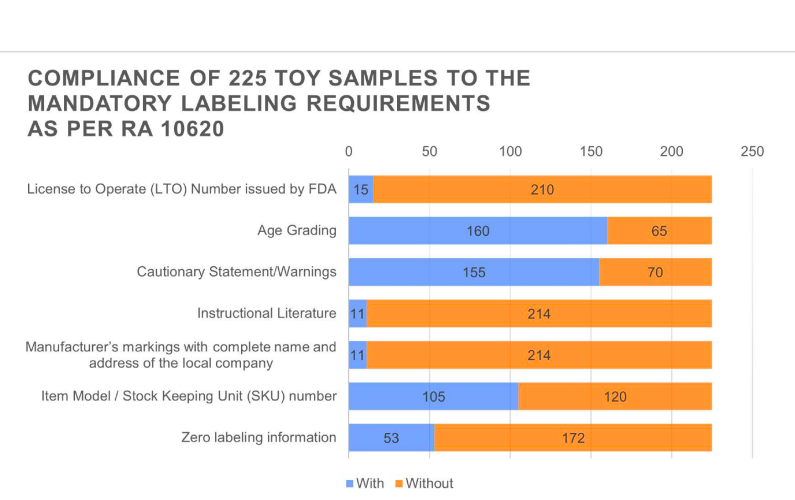
QUEZON CITY — Toys marketed for use by Filipino children remain poorly labeled, denying consumers their legal right to essential facts needed for informed purchasing decisions, especially with the ongoing Christmas toy shopping spree.
The EcoWaste Coalition, an advocate for children’s health and safety from hazardous chemicals and products, made this revelation ahead of the International Human Rights Day on December 10 to call attention to the right of all children to duly tested and labeled non-toxic toys to assist with their cognitive, motor, emotional and social skills development during their formative years.
“Our multi-city toy sampling shows that Republic Act No. 10620, or the Toy and Game Safety Labeling Act, remains poorly implemented 11 years after it was passed in 2013 and five years after its Implementing Rules and Regulations (IRR) were belatedly promulgated in 2019,” said Aileen Lucero, EcoWaste Coalition national coordinator. “A review of how the law is carried out should be scheduled next year to address enforcement challenges and issues, and ensure compliance to the special labeling requirements for toys, which are meant to uphold children’s right and access to safe toys.”
“Laws such as RA 10620 are not mere pieces of paper to be set aside just because it may be difficult to implement. There are legal and mandatory requirements which government agencies need to enforce, and manufacturers, importers, distributors, and retailers need to comply with under this law and its IRR,” said lawyer Gregorio Rafael Bueta, counsel of the EcoWaste Coalition. “RA 10620 is an important part of our legal framework as it transcends State policies on children’s rights, environmental safety, business responsibility, and consumer protection. The State, under the concept of parens patriae, owes the full and proper implementation of this law, and to hold violators accountable – to all Filipino children and families.”
Prior to this, the group conducted a 16-city toy sampling project, which kicked off in September with the start of the “ber” months. From September 9 to November 30 this year, the EcoWaste Coalition purchased a total of 225 assorted toys from retail stores in 16 cities, including Baguio, Antipolo, Meycauayan, Bacoor, Lipa, Cebu, Lapu-Lapu, Mandaue and Davao Cities, as well as Caloocan, Makati, Manila, Parañaque, Pasay, Quezon and Valenzuela Cities.
The labels of the toy samples were subsequently examined based on the requirements of RA 10620. As per its IRR and as reiterated by the Food and Drug Administration (FDA) through Advisory No. No. 2020-2022, toys, which are objects clearly intended as a plaything for kids below 14 years old, must carry the following information: 1) FDA-issued license to operate (LTO) number; 2) age grading; 3) cautionary statement/warnings; 4) instructional literature; 5) manufacturer’s markings; and 6) item model/stock keeping unit (SKU) number. Of the 225 products, 76 percent had zero labeling information and the rest provided incomplete information.

According to the analysis of labels, 93 percent of the samples had no FDA-issued LTO number. The LTO is issued to manufacturers, importers, and distributors whose toy products conform with the health and safety requirements of the Department of Health and the Philippine National Standard (PNS) pertaining to toys.
Furthermore, 28.9 percent of the samples provided no age-grading to guide consumers on age-appropriate toys; 31 percent supplied no cautionary statement/warnings; 95 percent provided no instructional literature; 95 percent lacked manufacturer’s markings; and 53 percent had no item model/SKU number.
Except for three toy cosmetic sets, which provided a detailed list of ingredients, the 223 samples provided no information about their chemical composition. However, the veracity of the information is not guaranteed as these unauthorized toy cosmetics have not been assessed by the FDA for their quality and safety.
Toy manufacturers, importers, distributors, and retailers found in violation of RA 10620 and its IRR will be fined not less than P10,000 but not more than P50,000, or imprisoned for not less than three months but not more than two years, or both, at the discretion of the court.
The said law also requires the removal from the market of toys and games that fail to follow the labeling and packaging requirements. These violative toys and games shall be confiscated, forfeited or disposed of in accordance with the law.
The sampling was conducted as part of the group’s long-standing campaign on toy safety, which systematically began in 2011 with the release of the results of a joint study with the International Pollutants Elimination Network (IPEN) on harmful chemicals in 200 toys purchased in Metro Cebu, Davao, and Manila.
Follow-up investigations and exposés indicated the prevalence of poorly labeled toys in the market with some items posing potential chemical, choking, flammability, laceration, strangulation, and other health and safety hazards.
For this year’s pre-Christmas sampling, the EcoWaste Coalition benefited from the participation of volunteers, particularly from the Action for Nurturing Children and Environment, Inc. (ANCE), Cebu City, and the Interfacing Development Interventions for Sustainability (IDIS), Davao City.
-end
Reference:
https://lawphil.net/statutes/repacts/ra2013/ra_10620_2013.html
https://doh.gov.ph/sites/default/files/policies_and_laws/IRR%20RA%2010620.pdf
https://www.fda.gov.ph/wp-content/uploads/2020/11/FDA-Advisory-No.2020-2022.pdf
